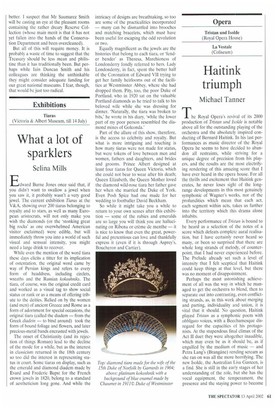Opera
Tristan und Isolde (Royal Opera House) La Vestale (Coliseum)
Haitink triumph
Michael Tanner
The Royal Opera's revival of its 2000 production of Tristan und Isolde is notable above all for the outstanding playing of the orchestra and the absolutely inspired conducting of Bernard Haitink. In his last performances as music director of the Royal Opera he seems to have decided to abandon all restraints, while striving for a unique degree of precision from his players, and the results are the most electrifying rendering of this amazing score that I have ever heard in the opera house. For all the thrills and excitement that Haitink generates, he never loses sight of the longrange developments in this most genuinely symphonic of Wagner's works, nor of the profundities which mean that each act, each segment within acts, takes us further into the territory which this drama alone inhabits.
Every performance of Tristan is bound to be heard as a selection of the notes of a score which defeats complete aural realisation, but I have certainly never heard so many, or been so surprised that there are whole long strands of melody, of counterpoint, that I had never experienced before. The Prelude already set such a level of intensity that I felt sceptical that Haitink could keep things at that level, but there was no moment of disappointment.
Perhaps the most astonishing achievement of all was the way in which he managed to get the orchestra to blend, then to separate out into contrasting, even conflicting strands, as, in this work about merging and parting, individuality and union, it is vital that it should. No question, Haitink played Tristan as a symphonic poem with obbligato voices, with a Beechamesque disregard for the capacities of his protagonists. At the stupendous final climax of the Act II duet they were altogether inaudible, which may even be as it should be, as if engulfed by the medium of music — and Petra Lang's (Brangane) rending scream as she ran on was all the more horrifying. The new Isolde, the Australian Lisa Gasteen, is a find. She is still in the early stages of her understanding of the role, but she has the vocal equipment, the temperament, the presence and the staying power to become the next truly great singer of the part. In passages of unbridled fury, such as the Act I curse, and of abandonment to ecstasy, as in the invocation to Frau Minne in Act II, she already has everything that she will ever need, and the effect is volcanic. In the more introspective passages she sometimes seems at a loss, interpretatively, and her voice loses body when she sings quietly. Nonetheless, she is the most hopeful new presence on the Wagnerian scene for many years.
Tristan is also a newcomer, with the promising name of Wolfgang MillerLorenz. He is not, and will never be, a Heldentenor, but if he helps to keep Wagner's works on the stage until, if ever, one is discovered, he will have served a purpose. He has a smallish, not very attractive voice, and by the second half of his Act III monologues he was croaking and cracking; he seemed bewildered sometimes, too, by the production, as well he might be. But he is not unmusical, and a more helpful director might get him to act with reasonable conviction.
The Marke of Robert Lloyd is tremendous, a full recovery of vocal form. He sings his Act II reproaches very much more in anger than in sorrow, and only just manages not to strike Tristan with his riding whip at what he takes to be his insolence. He is bent with grief, and weirdly bespectacled, in Act III. The contrast between his incomprehension and Isolde's exaltation can never have been more effective, with Haitink conducting the final minutes with staggering intensity, and at a volume much greater than I have ever heard before in Covent Garden.
The production, originally by Herbert Wernicke, revived by Halina Ploetz, should have been allowed to perish. It has nothing whatever to be said in its favour, and whenever it makes a point it goes crudely against the drama, without any compensating independent insights. It also takes place on slopes so steep that the singers are clearly impeded and exhausted by their efforts not to slide off them. That Tristan and Isolde should never touch is a trick so trite and so unrewarding that any competent director would have been ashamed of himor herself for entertaining the conceit for a moment. Conceit seems to be the name of Wemicke's game. Still, for what you will hear and be stunned by, this is an altogether unmissable experience.
It makes, too, ENO's production of Spontini's La Vestale seem even more tedious in retrospect than it did at the time. It was a vehicle for Jane Eaglen as Julia, the proto-Norma who falls for a Roman general and is only miraculously rescued. As we know from relatively complete accounts of the work from Callas and Gencer, it can be briefly resuscitated by a singer of genius, but otherwise it remains as cold and unmoving as the neo-classical sculpture of which it is the operatic equivalent. Eaglen, with no expressive capacities, and sounding vocally worn, often sharp, would have been enough to depress a much livelier piece. The sparse supplies of enjoyment came from Anne-Marie Owens's noble and dignified Grand Vestal, and Paul Nilon's Cinna, a comprimario role, but one of which every word was audible. David Parry was the four-square, unanimating conductor.



















































































 Previous page
Previous page